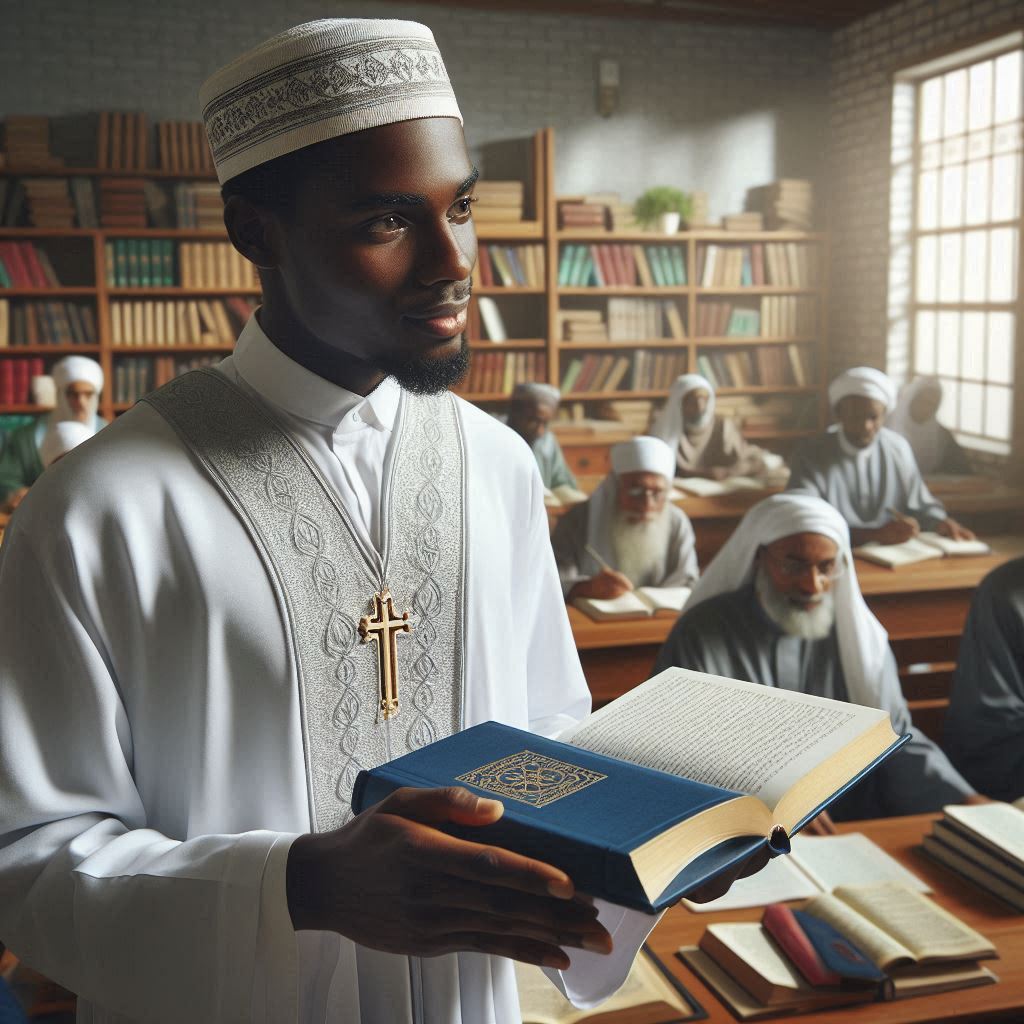Introduction
Christian Religious Studies (CRS) stands as an enduring cornerstone within Nigerian education. Christian Religious Studies Impact on Nigerian Society
Its roots trace back to the colonial era, intertwined with Nigeria’s historical narrative.
Introduced alongside Western education, CRS swiftly became a fundamental subject.
From its inception, CRS aimed not only to educate but also to instill moral values.
In Nigeria’s diverse religious landscape, CRS serves as a unifying force, transcending denominational divides.
Its teachings permeate society, shaping individual beliefs and collective norms.
Beyond the classroom, CRS influences various aspects of Nigerian life, from governance to culture.
Through its teachings, CRS fosters virtues such as compassion, empathy, and social responsibility.
CRS serves as a reservoir of cultural heritage, preserving Nigeria’s Christian identity amidst modernization.
In this section, we embark on a journey to unravel the profound impact of CRS on Nigerian society.
Influence of Christian Values on Nigerian Society
When it comes to the influence of Christian values on Nigerian society, it is evident that Christian religious studies have played a significant role in shaping the moral fabric of the nation.
Here, we will delve into the impact of Christian teachings on promoting moral values among Nigerian citizens, as well as provide examples of how these teachings have shaped ethical behavior and attitudes in the society.
Impact of Christian Values on Nigerian Society
- Christian religious studies have instilled key moral values such as love, compassion, and forgiveness among Nigerians.
- These values have influenced the way individuals interact with one another and have contributed to a sense of unity and harmony in Nigerian society.
- Through teachings on honesty and integrity, Christian values have promoted ethical behavior in various aspects of life, including business and governance.
- Christian teachings emphasize the importance of respecting authority and following laws, which has helped in maintaining social order and stability in Nigerian communities.
Examples of Christian Teachings Shaping Ethical Behavior
- One notable example is the emphasis on the sanctity of marriage in Christian teachings, which has encouraged fidelity and commitment among couples in Nigeria.
- Christian values also stress the significance of helping the less fortunate, leading to numerous charitable activities and organizations that support underprivileged individuals in Nigerian society.
- The teachings of forgiveness and reconciliation have played a crucial role in resolving conflicts and promoting peace among different ethnic and religious groups in Nigeria.
- Christian values promoting humility and selflessness have inspired many Nigerians to engage in acts of service and volunteerism for the betterment of their communities.
Generally, the impact of Christian values on Nigerian society cannot be overstated.
The teachings of love, compassion, honesty, and integrity have significantly influenced the moral character and behavior of individuals in the nation, contributing to a more cohesive and virtuous society.
Read: Exploring Semiotics in Communication Arts
Contribution of Christian Religious Studies to National Unity
Christian religious studies have significantly contributed to promoting national unity in Nigeria. Below are some key points that highlight the impact of Christianity in fostering unity among diverse religious groups:
- Analysis of how Christian religious studies have played a role in fostering unity among diverse religious religious groups in Nigeria.
- Examination of how the teachings of love, forgiveness, and compassion in Christianity have promoted peace and harmony in the country.
Through the study of Christian religious texts and doctrines, individuals are encouraged to treat others with kindness and respect, irrespective of their religious affiliations.
This promotes a sense of inclusivity and coexistence among people of diverse religious beliefs, thereby contributing to national unity.
Furthermore, Christian religious studies provide a platform for individuals to learn about the principles of tolerance and acceptance towards others.
By understanding and appreciating the beliefs and practices of different religious groups, individuals are better equipped to engage in interfaith dialogue and promote mutual understanding.
Moreover, Christian religious studies promote the values of social justice, equality, and human rights, which are essential components of a just and equitable society.
By advocating for these values, Christianity contributes to the creation of a more tolerant and inclusive society where individuals are treated with dignity and respect.
How the teachings of love, forgiveness, and compassion in Christianity have promoted peace and harmony in the country
Christianity, as a major religion in Nigeria, has been instrumental in bringing together people from different religious backgrounds under one umbrella of faith.
The teachings of Christianity emphasize the importance of love, forgiveness, and compassion, which are essential values for fostering unity and harmony among individuals and communities.
The teachings of Christianity also advocate for the resolution of conflicts through peaceful means and encourage reconciliation and forgiveness.
This has played a significant role in mitigating religious tensions and promoting peaceful coexistence among various religious communities in Nigeria.
Overall, Christian religious studies have been instrumental in promoting national unity in Nigeria by fostering a sense of inclusivity, tolerance, and mutual respect among individuals of diverse religious backgrounds.
The teachings of love, forgiveness, and compassion in Christianity have contributed to peace and harmony in the country, making Christianity a unifying force in a diverse society.
Read: Developing Critical Thinking in Language Arts
Role of Christian Religious Studies in Education and Social Development
How Christian Religious Studies Have Contributed to the Intellectual and Social Development of Nigerian Students
Christian Religious Studies (CRS) significantly contributes to the intellectual and social development of Nigerian students.
CRS enhances critical thinking by encouraging students to analyze biblical texts, ethical dilemmas, and historical contexts.
Students gain a deeper understanding of cultural traditions and moral frameworks that shape societal norms.
By engaging with complex theological concepts, students develop analytical skills and a nuanced worldview.
CRS not only imparts knowledge but also molds character, creating individuals who uphold strong ethical values.
In educational settings, CRS creates a supportive environment where students can explore their faith and its implications.
Teachers and educators in CRS act as role models, embodying the principles they teach.
This mentorship further reinforces the importance of discipline, hard work, and service.
Through structured lessons and community service projects, CRS students practice what they learn, impacting society positively.
These teachings help shape well-rounded individuals who contribute meaningfully to the social fabric of Nigeria.
The Values of Discipline, Hard Work, and Service to Others Instilled Through the Teachings of Christian Religious Studies
CRS instills values of discipline, emphasizing the importance of adhering to moral and ethical standards in daily life.
Through structured lessons, students learn the value of perseverance and the importance of maintaining personal integrity.
Hard work is another core value taught in CRS, encouraging students to strive for excellence in all their endeavors.
Students are motivated to put in consistent effort, understanding that diligence leads to both academic and personal success.
Service to others is a fundamental principle of CRS, promoting a sense of community and social responsibility.
Students are encouraged to engage in acts of kindness and support within their communities, fostering a culture of altruism.
These values create a supportive environment where students can explore their faith and its implications.
By nurturing intellectual growth and moral development, CRS contributes to the overall betterment of society.
The subject’s emphasis on ethical living and community service prepares students for active, engaged citizenship.
Ultimately, CRS shapes individuals who are not only knowledgeable but also morally grounded and socially responsible.
This dual focus on intellect and character development ensures that CRS remains a cornerstone of Nigerian education.
Through its comprehensive teachings, CRS continues to positively impact the lives of countless Nigerian students.
The values instilled through CRS have a lasting impact, influencing students’ personal and professional lives.
Transform Your Career with Expert Guidance
Get personalized mentorship consulting that’s tailored to your unique path. Our expert advice is actionable and exclusive.
Get StartedAs a result, CRS fosters a generation of disciplined, hardworking, and community-oriented individuals.
These individuals often become leaders in various fields, driving social development and positive change.
In summary, CRS plays a vital role in the educational and social landscape of Nigeria.
Read: Student Experiences: Life in Communication Arts

Uncover the Details: Integrating European Languages into Nigerian Curriculum
Discover More: Curriculum for Criminology Studies in Nigeria
Challenges and Controversies Surrounding Christian Religious Studies in Nigeria
Examination of the criticisms and controversies surrounding the teaching of Christian religious studies in a multicultural and multi-religious society like Nigeria
- One of the major challenges facing the teaching of Christian religious studies in Nigeria is the diversity of religions present in the country.
- This diversity often leads to tensions and conflicts between different religious groups, with some arguing that the teaching of Christian religious studies in schools favors one religion over others.
- Another criticism leveled against the teaching of Christian religious studies is that it reinforces stereotypes and prejudices, particularly against minority religious groups.
- Some critics argue that the subject should be replaced with a more inclusive and neutral curriculum that covers a broader range of religions to promote religious tolerance and understanding.
Analysis of the debates on whether the subject should be compulsory or optional in Nigerian schools
- One of the ongoing debates surrounding Christian religious studies in Nigeria is whether it should be a compulsory or optional subject in schools.
- Proponents of making Christian religious studies compulsory argue that it is essential for instilling moral values and ethics in students, as well as promoting the country’s Christian heritage.
- On the other hand, opponents of compulsory Christian religious studies argue that it violates the secular nature of the Nigerian state and infringes on students’ rights to freedom of religion and belief.
- There are also concerns that making the subject compulsory may marginalize students from minority religious groups and create divisions among students based on their religious beliefs.
Read: Communication Arts: Balancing Theory and Practice
Uncover the Details: Career Paths for Philosophy Graduates in Nigeria
You Might Also Like: Postgraduate Mass Communication Programs Nigeria
Find Out More: Career Opportunities for Foreign Language Graduates
Learn More: Top Fashion Schools and Programs in Nigeria
Future Prospects of Christian Religious Studies in Nigerian Society
Importance of Christian Religious Studies in the Future
Christian religious studies play a vital role in shaping the future of Nigerian society.
As a predominantly Christian nation, understanding the teachings of Christianity is essential for moral and ethical development.
Moreover, Christian values such as love, forgiveness, and compassion are fundamental in promoting unity and harmony among diverse ethnic and religious groups in Nigeria.
By studying Christian religious texts, individuals can gain insights into how to navigate complex social issues and promote peace in society.
Potential Impact of Christian Religious Studies
Christian religious studies have the potential to instill moral values and ethics in the younger generation, thereby reducing crime rates and promoting societal well-being.
By emphasizing virtues like honesty and integrity, Christian religious studies can contribute to building a more ethical and responsible society.
Furthermore, Christian religious studies can foster a sense of community and solidarity among Nigerians.
By promoting values of mutual respect and understanding, these studies can bridge cultural and religious divides, leading to a more cohesive and tolerant society.
Reforms and Adaptations for a More Inclusive Approach
To ensure that Christian religious studies are inclusive and beneficial to all members of Nigerian society, certain reforms and adaptations may be necessary.
One key reform is to promote interfaith dialogue and understanding, allowing individuals from different religious backgrounds to engage in meaningful conversations and learn from each other’s beliefs.
Additionally, Christian religious studies should be taught in a way that respects and acknowledges the diversity of religious beliefs in Nigeria.
By incorporating teachings from other faith traditions, educators can provide a more comprehensive and inclusive religious education that promotes tolerance and acceptance.
Generally, Christian religious studies have the potential to shape a more ethical, cohesive, and tolerant society in Nigeria.
By considering the relevance and impact of these studies, and implementing necessary reforms and adaptations, we can ensure that Christian religious studies continue to play a positive role in the future development of Nigerian society.
You Might Also Like: Challenges Facing Psychology Practice in Nigeria
Discover More: Eco-friendly Art Practices in Nigeria
Conclusion
In closing, Christian religious studies play a significant role in shaping Nigerian society.
It provides moral and ethical guidance, instills values, and contributes to the overall well-being of individuals.
Through the teachings of Christianity, Nigerians are encouraged to live righteously and uphold principles of love and compassion.
Moreover, Christian religious studies promote unity and cohesion among diverse groups in the country.
It fosters a sense of community and belonging, fostering relationships that transcend religious and cultural differences.
It is crucial to recognize the importance of promoting tolerance, understanding, and respect for different religious beliefs.
By embracing the teachings of Christian religious studies, Nigerians can cultivate a society that values diversity and embraces inclusivity.
Overall, the impact of Christian religious studies on Nigerian society is profound and enduring, shaping individuals and communities for the better.
It is vital to continue promoting the values of love, tolerance, and respect for all, regardless of religious affiliations.
As Nigeria moves forward, the teachings of Christian religious studies will continue to play a crucial role in building a harmonious and cohesive society.




